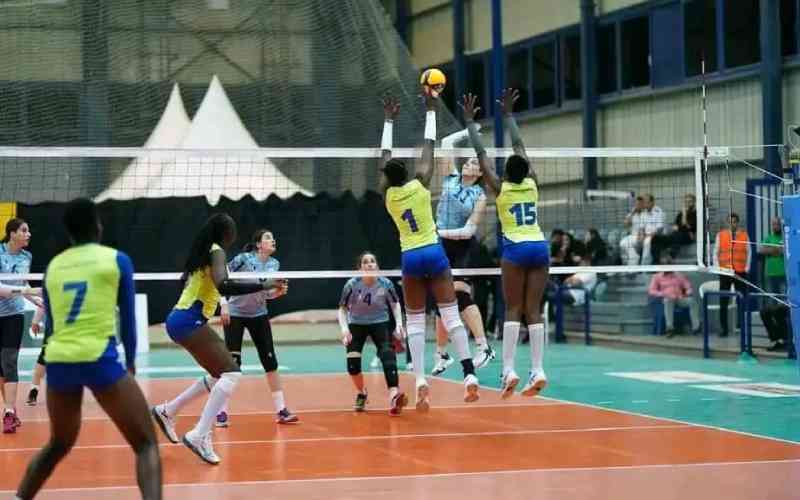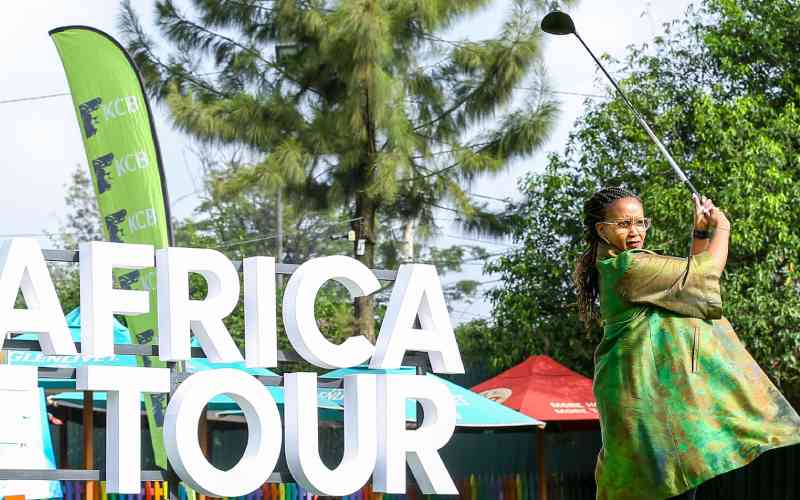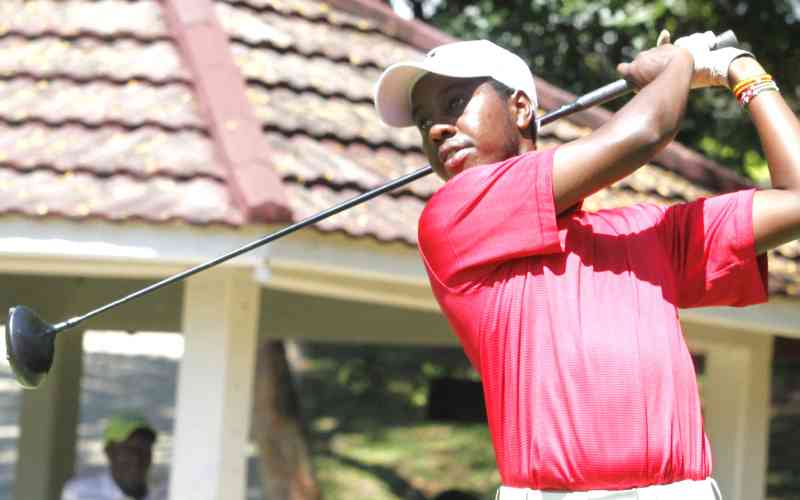 |
|
A social worker talks to parents of six-year-old Waare Elema, an autistic child who is tied to a hut because her parents are worried she might disappear when they are away with their animals. [PHOTOS:NANJINIA WAMUSWA/ |
By NANJINIA WAMUSWA
Marsabit, Kenya: Three huts welcome you to a manyatta at El Boji village, Kalacha, in North Horr constituency, Marsabit County.
It has been a four-hour drive through a rough terrain from Marsabit town, with temperature standing at 46ºC. A warm wind blows violently, raising clouds of dust that envelope the manyattas.
Outside one of the huts, a lone little girl wearing a black kitenge blouse with yellow floral patterns and khaki skirt is crouched.
Her left hand is tied with a long black piece of a rope that is secured to the hut.
The roar of a car announcing our arrival startles the little girl and several people inside the manyatta. They come out and stare, amazed.
The girl makes a weird noise, shakes her head violently and grinds her teeth. She struggles to free herself, but is held back by the rope.
Waare Elema, six, is autistic and mentally challenged. She has spent four years on the tether. Her nomadic pastoralist parents tie and leave her behind as they move with their cattle in search of pasture and water for their cattle.
Under normal circumstances, Waare would be moving with her parents just like her four-year-old brother.
“This place is dry and we are forced to travel to far places to graze our animals. We fear leaving her (free) because she can disappear,” says her father, Elema Isako.
The family is poor and sometimes leaves her without food. Says Elema: “When there’s food, we give her enough to last her a whole day till we are back.”
Waare is not alone.
A local social worker and nurse Andrew Boku says that there are many mentally and physically challenged children in pastoralist communities facing such challenges.
Bitten by snake
“In this area there are more than 20 such children with various disabilities facing the same fate. They are either tied or locked inside huts for one or more days,” says Boku.
Stay informed. Subscribe to our newsletter
Another such child is Roba Umuro from Gocha village. Umuro, 15, is physically challenged. He cannot walk. His parents abandoned him and now he is under the care of grandmother who also leaves him for days alone in the manyatta.
Boku says children with disabilities are considered a burden to parents who have to move with animals from place to place.
Waare’s father says since she cannot walk she’s a burden. He says: “She cannot walk and, therefore, going out with her complicates our movement.”
Joining a sect
Her mother, Woto Elema, regrets that they are forced by circumstances to tether and live behind their disabled child.
“I travel searching for water in far places. I fear she might get sick along the way and to carry her back home would be a problem,” says Woto.
In June last year, Waare was tied as usual to the hut when a snake appeared and bit her while all family members were away. They arrived later at night to find her body dark and swollen. “We quickly realised it was a snakebite because we know their symptoms,” says her mother.
They could not take her to a health facility. The only hospital near with anti-venom where they could take and treat her is Marsabit District Hospital, almost 160km away. They opted for local treatment using herbs.
Boku says lack of health facilities in the area have forced locals to opt for herbs and witchdoctors even in situations that clearly require the attention of health professionals.
Mr Isako says without health facilities nearby, the sole and available option is to join or go to a sect called Ayana where people allegedly go for social, physical and spiritual treatment.
“Here, I was asked to produce two goats but even after they were slaughtered and eaten, my child never recovered,” he says.
Isako has left his child’s suffering to God or fate, to take her away where she can rest.
At birth Waare was normal. Her mother says she never attended any clinic since there are no health facilities nearby and was assisted by fellow woman during birth at home. Waare’s condition was discovered at the age of two years.
Kenya Pastoralist Network for Children Co-ordinator Abdi Omar Farah says that children from pastoralist communities are more disadvantaged because they have no health and educational facilities near them.
He says their issues are unique. “These people depend entirely on livestock and they will always move from place to place looking for pasture and water for their animals and health and education becomes secondary to them,” he says.
Mobile clinic
Abdi says maternal deaths are high and calls for an urgent intervention. He adds that the issues leaders should be addressing are how to make basic requirements like health and education accessible to nomadic pastoralists.
Residents say they will use health facilities if provided, but after attending to their livestock first.
Boku says the community needs fully fitted mobile clinics to help sick children and adults in areas inhabited by nomadic pastoralist as access to medical care is a basic requirement and a human right,” says Mr Boku, a nurse and counsellor of 10 years experience in the military.
 The Standard Group Plc is a
multi-media organization with investments in media platforms spanning newspaper
print operations, television, radio broadcasting, digital and online services. The
Standard Group is recognized as a leading multi-media house in Kenya with a key
influence in matters of national and international interest.
The Standard Group Plc is a
multi-media organization with investments in media platforms spanning newspaper
print operations, television, radio broadcasting, digital and online services. The
Standard Group is recognized as a leading multi-media house in Kenya with a key
influence in matters of national and international interest.
 The Standard Group Plc is a
multi-media organization with investments in media platforms spanning newspaper
print operations, television, radio broadcasting, digital and online services. The
Standard Group is recognized as a leading multi-media house in Kenya with a key
influence in matters of national and international interest.
The Standard Group Plc is a
multi-media organization with investments in media platforms spanning newspaper
print operations, television, radio broadcasting, digital and online services. The
Standard Group is recognized as a leading multi-media house in Kenya with a key
influence in matters of national and international interest.









